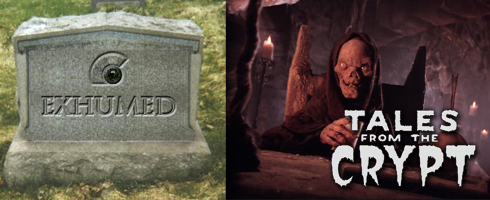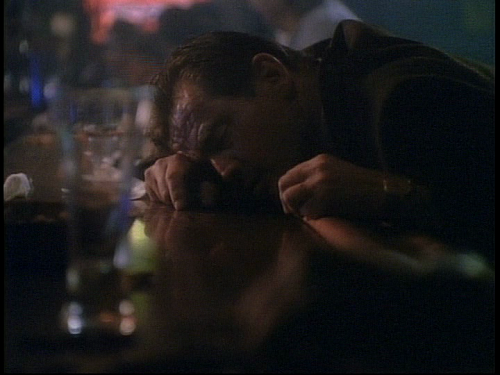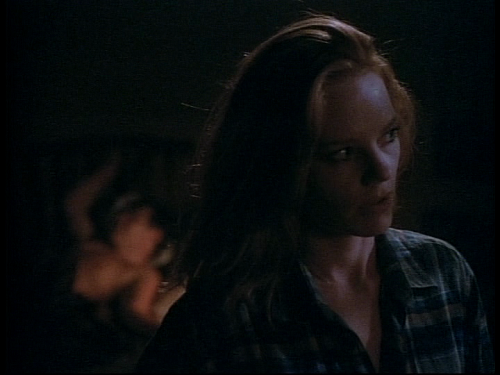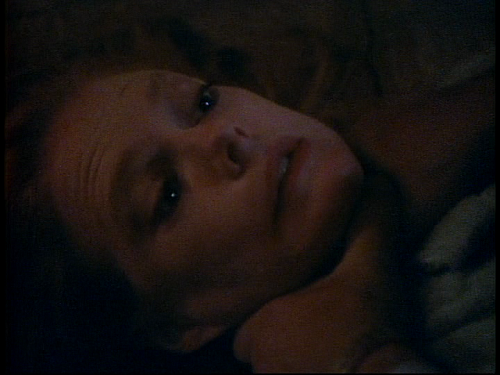
Deadline (3.12)
“I really do need a drink.”
WHAT IS IT?
An aging reporter struggling with alcoholism goes to great lengths to get a scoop.
WHO’S RESPONSIBLE?
Whenever you see Walter Hill’s name on the creative team of a Crypt episode, it’s always a good thing. Here he both directs and writes, with help from his frequent assistant/Associate Producer Mae Woods. The great Richard Jordan (Logan’s Run, Hunt For Red October) leads in what would turn out to be one of his very last performances before dying of a brain tumor two years later. The supporting cast includes Marg Helgenberger (the scientist babe from Species) and Coen Brother’s favorite Joseph Polito.

HOW IS IT?
You know why I’m always excited to see Walter Hill’s Crypt episodes? Because, more than probably any other Crypt director, he takes this stuff seriously. Directing for television, with it’s tight budgets and tighter schedules, is not generally a director’s medium, but Hill always turns out good work, paying attention to things like performances, atmosphere, and mise-en-scene. Hell, even the score to this episode is a considerable step up from what we’re used to. Other good Crypt directors (such as Richard Donner) also turn out good work, but they also usually seem to be using the opportunity to mess around with the stylistic and tonal freedom that Crypt allows. Hill’s episodes, on the other hand, never seem to be too concerned with being pulpy or fun, and the result in this case is a slow-burn episode that makes a relatively uneventful story compelling with impeccable performances and a tightly wound dramatic arc.
We’re introduced to our main character through a pretty useless framing device (more on that later). He is Charles McKenzie (Richard Jordan), a one-time hot shot newspaper reporter who fell from grace after his alcoholism caught up with him. It’s a very popular stock character for Crypt (after all, desperate people often do desperate things) but under Walter Hill’s skilled hands Richard Jordan delivers a full realized character filled with spite, sadness, and self-loathing. He spends his nights getting trashed at his local watering hole, he spends his days trying to convince his exasperated sister to keep loaning him money so he can make the rent. With a show as eclectic as Crypt you can through a multitude of reactions, but this was the first episode since Collection Completed that I found myself feeling an intense empathy for a character. It isn’t until he falls in love with beautiful barfly Vicki (Marg Helgenberger) that he finds a reason to turn his life around. This too is a tragic relationship: all she wants is a no-strings attached sexual relationship (not even telling him her last name) and though he agrees to these terms, it’s obvious he needs more.

Given his new love, he decides that he’s going to clean up his act and start working again. But his former editor Phil isn’t convinced that Charles has fully turned over a new leaf. But after a fair amount of reminiscing, bullshitting, and begging, Phil gives him an ultimatum: get a big juicy murder story, like he used to get in his hey day, and he can have his job back. Charlie wants to celebrate his newfound prospects and sobriety by buying Vicki some nice earrings, but she pulls away, rightfully afraid he’s getting too attached. At any rate, his celebration might be premature since his first day back on the beat proves a lot harder than he figured. Being away from the game so long means he’s lost touch with all of his old contacts, as demonstrated in a fantastically anxious montage in which Charles gets more desperate and panicked with each dead end. Despondant, with nowhere to turn to, he returns to his local bar desperately thirsty for a drink. But his dear friend the bartender refuses to serve him and after begging and pleading fails for the second time that day, he heads out to a local greasy spoon diner.
The owner of the diner Nikos Stano as expertly played by Jon Polito. After Nikos handles Charles, he goes into the back where he starts to fight with his wife. Through their argument we learn that she goes out on the town nearly every night, and Nikos is convinced that she’s cheating on him. The argument quickly escalates until Nikos stranges his wife. When he comes out from the back, he is visibly shaken, crying even. Joe Polito is an extremely talented character actor and at first I was surprised that his character didn’t show up until the final five minutes of the episode. But Joe gives his character something that, in the numerous cases of uxoricide Crypt has had, we’ve yet to see: true, unqualified remorse. Even with her fooling around, you can still tell his love for her and it’s actually quite touching. Charles, realizing his luck, whips out his pen and notepad and starts grilling Nikos for details. After he’s gotten all he needs, he offers to go in the back and call the cops. He actually calls the newspaper, dictating the lead to this hot story. But she begins to stir, alive after all, it’s revealed that Nikos wife was actually Vicki. In a furious mix of jealousy, anger, and desperation he finishes the job Nikos started, and strangles her.
Which brings us to the framing device. This is the only part of the episode that really doesn’t work. The episode begins with a close-up of Charles in a dark room, directly addressing the audience, setting up his fall from newspaper reporter supremecy. After the episode it ends, it’s revealed that he’s straitjacketed, having been narrating from inside of an insane asylum this whole time. Hill’s slow and deliberate pacing may have made this a particularly thoughtful and poignant episode of Tales From the Crypt, but it also means that it feels less like a complete story and more like the first act of a longer, maybe feature-length, film. It’s implied that after finishing off Vicki, Charles went on to commit more murders and report on them, but not seeing that descent into murder (much like the one we saw in Easel Kill Ya), makes for an incredibly unsatisfying ending. Still, even without closure, we’re left with a unique character-driven episode that feels a lot more mature than what we’re used to seeing here. I can see die-hard fans of Crypt hating this more sophisticated and less lurid approach, but I think it completely works on it’s own terms.

DOES IT HATE WOMEN?
Walter Hill’s surprisingly empathetic take on the story extends to the character of Vicki as well. I wouldn’t be surprised if in the comic Vicki was a more typical cheating whore of a wife, leading Charles on, but here she goes to great lengths to try to ensure he doesn’t get too attached. Even her husband weeps when he thinks he killed her. Her death isn’t played as a comeuppance of any kind, but of a shocking and terrible thing.
ALSO WORTH NOTING:
* The superior score to this episode was composed by Steve Bartek, the lead guitarist for Oingo Boingo.
* Another example of Hill’s master direction: the dizzying tracking shot that follows Charlie and Phil through the crowded newspaper room. It’s not quite Brazil, but for a show like this, it’s impressive.
* More boobs! Season three really pulled out all the nudity stops, didn’t it?
WORST CRYPT KEEPER JOKE:
“Can I interest you in a Mai Die? How about a Rum and Choke?”
GRADE: B+
JOHN SAYS:
Walter Hill’s two previous episodes were series highlights, but I’m afraid this one just doesn’t pull it off. I like what they’re doing, and when this episode works it works very well. It’s an unvarnished look at failure and desperation, almost like The Wrestler-lite, and Jon Polito is insanely good in it. Like, good enough to reconsider him as an actor (it’s one thing to be well cast in a Coen Brothers movie, but he knocks it well out of the park here). But it really does feel like an interesting story that ends about halfway through, right when the tone and character detail work were about to start paying real dividends. There’s room for episodes like this, but it’s got less of a payoff than any other I can think of, and for good or ill, that makes not a very good ‘Tales from the Crypt episode’, if you will. As a short piece by Walter Hill or a showcase for Jordan and Polito, it has its charms.